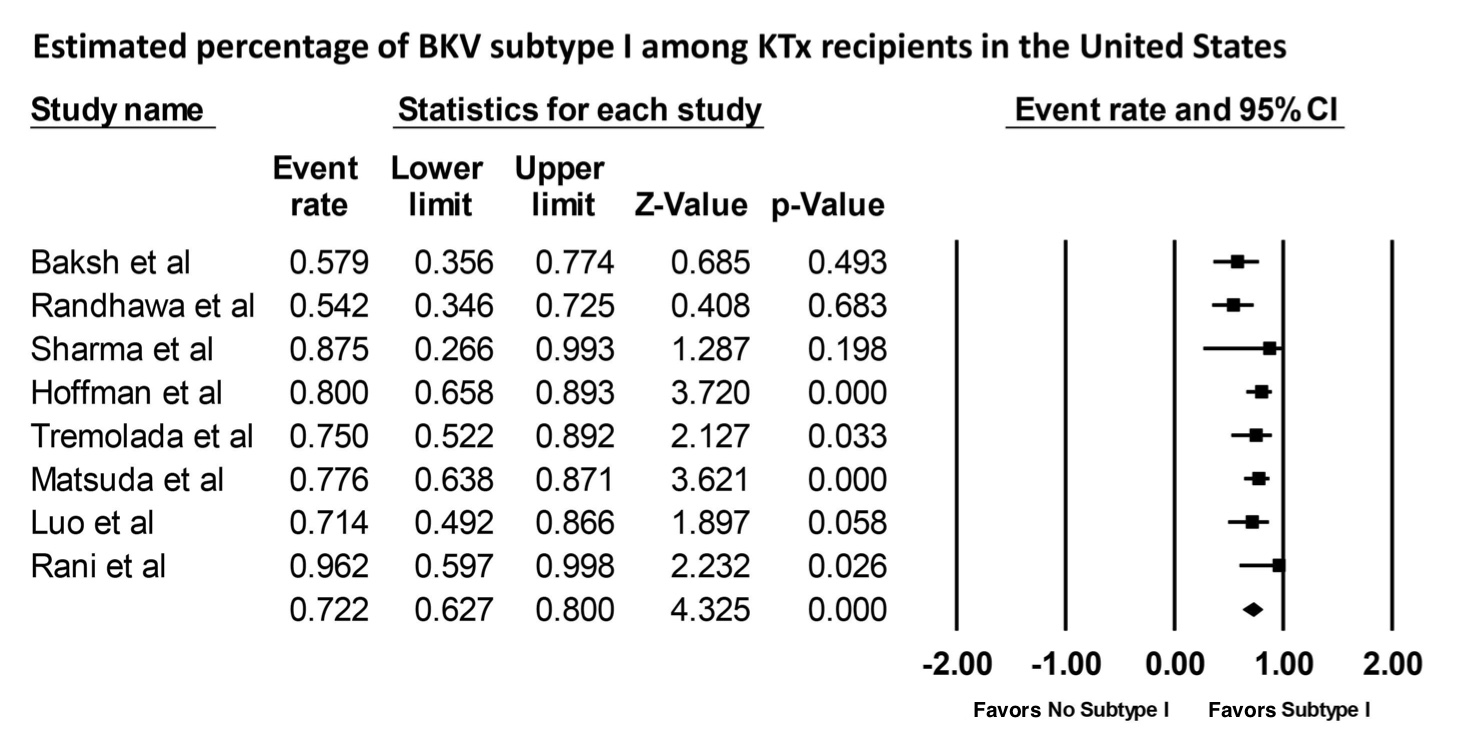Polyomavirus Genotypes In Renal Transplant Recipients In The United States
1Henry Ford Transplant Institute, Detroit, MI, 2Mayo Clinic, Rochester, MN, 3University of Missouri, Kansas, MO, 4Mahidol University, Bangkok, Thailand, 5University of Mississippi, Jackson, MS
Meeting: 2019 American Transplant Congress
Abstract number: C260
Keywords: Infection, Kidney, Kidney transplantation, Polyma virus
Session Information
Session Name: Poster Session C: Kidney: Polyoma
Session Type: Poster Session
Date: Monday, June 3, 2019
Session Time: 6:00pm-7:00pm
 Presentation Time: 6:00pm-7:00pm
Presentation Time: 6:00pm-7:00pm
Location: Hall C & D
*Purpose: BK Polyomavirus (BKV) subtypes and subgroups present uneven geographical distribution, suggesting a potential relationship with ethnicity. In the United States where there is a definite racial and ethnic diversity, the epidemiology of BKV genotypes remains unclear. This meta-analysis was conducted with the aim to assess BKV genotypes among kidney transplant (KTx) recipients.
*Methods: A comprehensive literature review was conducted utilizing MEDLINE, Embase, and Cochrane Database through October 2018 to identify all studies that reported BKV subtypes and/or subgroups in KTx recipients in the United States. Effect estimates from each individual study were extracted and combined using random-effect, generic inverse variance method of DerSimonian and Laird.
*Results: 8 observational studies with a total of 193 samples (urine, blood, and kidney tissues) from 188 BKV-infected KTX recipients in the United Stateswere enrolled. The study years ranged from 2001 to 2016. Overall, the pooled estimated percentages of BKV subtypes were 72.2% (95%CI: 62.7%-80.0%) for subtype I, 6.8% (95%CI: 2.5%-16.9%) for subtype II, 8.3% (95%CI: 4.4%-15.1%) for subtype III, and 16.1% (95%CI: 10.4%-24.2%) for subtype IV, respectively. While meta-regression analysis demonstrated a significant positive correlation between year of study and the percentage of BKV subtype I (slopes = +0.1023, P =0.01), there were no significant correlations between year of study and percentages of BKV subtype II-IV (P >0.05). Among KTx recipients with BKV subtype I, the pooled estimated percentages of BKV subgroups were 22.4% (95%CI: 13.7%-34.5%) for subgroup Ia, 30.6% (95%CI: 17.7%-47.5%) for subgroup Ib1, 47.7% (95%CI: 35.8%-59.9%) for subgroup Ib2, and 4.1% (95%CI: 1.2%-13.3%) for subgroup Ic, respectively.
*Conclusions: BKV subtype I is the most prevalent subtype among KTx recipients in the United States and its percentage seems to increase overtime. Subgroup Ib2 is the most common among BKV subtype I. Further analysis is needed to assess the effect of BKV genotype on the clinical course of BK viremia in KTx.
To cite this abstract in AMA style:
Khoury N, Thongprayoon C, Leeaphorn N, Bruminhent J, Cheungpasitporn W. Polyomavirus Genotypes In Renal Transplant Recipients In The United States [abstract]. Am J Transplant. 2019; 19 (suppl 3). https://atcmeetingabstracts.com/abstract/polyomavirus-genotypes-in-renal-transplant-recipients-in-the-united-states/. Accessed July 12, 2025.« Back to 2019 American Transplant Congress

